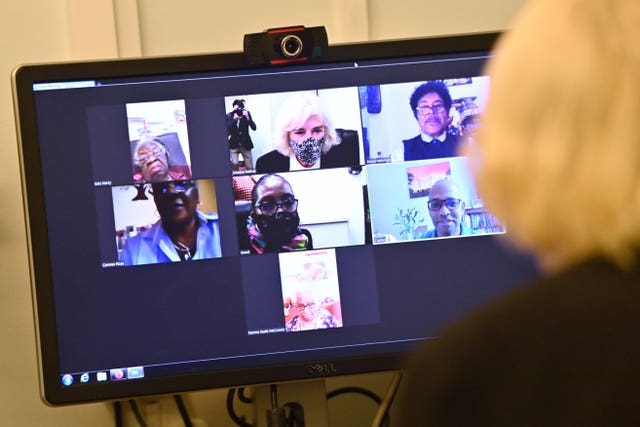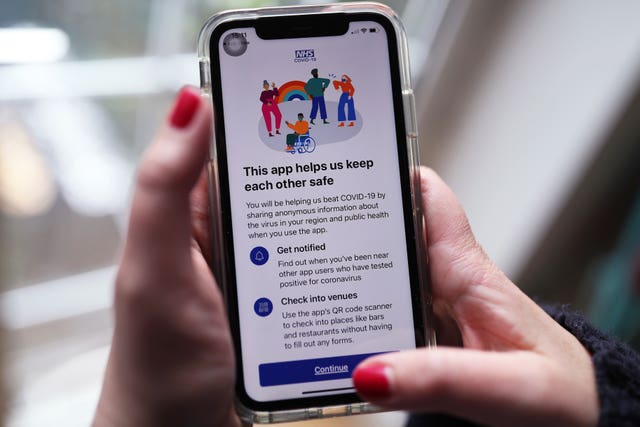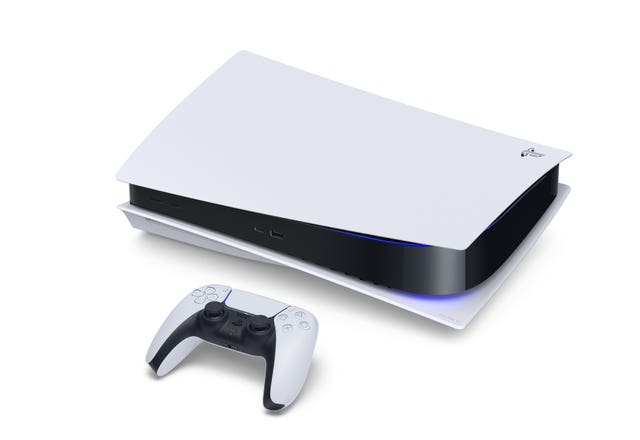
Iain Dale 7pm - 10pm
26 December 2020, 07:04

Technology played a major role during the coronavirus pandemic.
In what has been a unique year for the modern world, technology has shown no sign of being any less relevant, with apps, software and gadgets being a vital part of some of the biggest stories of the last 12 months.
During lockdown, communication tools were central in ensuring fragments of normality remained, allowing people to work, study and socialise with friends and family despite social distancing.
In addition, several key pieces of new technology have also been released this year.
Here is a look at the major tech talking points of 2020.
– The rise of Zoom
As the world went into lockdown at the beginning of the year and remote work and study became normal for many, a previously relatively unknown video conferencing tool suddenly became a central part of most people’s day.
As well as work calls, study groups, quizzes, birthday parties and even weddings were being held over Zoom, while Prime Minister Boris Johnson initially used the platform for some Cabinet meetings and to take questions from journalists during the Downing Street briefings on the pandemic.

In just a few months, user numbers rose from around 10 million in December 2019 to more than 300 million a day by April 2020 – an increase so dramatic the company itself later admitted it struggled to cope with the new waves of interest and scrutiny.
Hundreds of millions of new sets of eyes on Zoom quickly highlighted a number of privacy and security flaws, including the phenomenon of “Zoombombing”, where strangers were able to burst into calls uninvited, often shouting abuse or broadcasting offensive content to others on the call.
In response to the outcry and its newfound status as a tech giant, Zoom announced a 90-day programme from the beginning of April to update its security settings across the board, pausing all over software development in order to upgrade the app and add a range of privacy and safety tools.
The use of Zoom has become synonymous with 2020, with phrases such as “You’re on mute” entering the public lexicon and likely to be forever associated with this year.
– The Covid-19 contact tracing app
Even the UK’s response to the pandemic contained a key technological issue – how best to develop contact tracing to help stop the spread of the virus?
Industry giants Apple and Google quickly announced plans to work together on an exposure notification system that worked across the iOS and Android operating systems, which was privacy-centric and could be tied in with contact tracing apps in participating countries.
In contrast, the Government initially announced plans to use an alternative system for an app in England and Wales, one where some user data was collected on a central server, and which raised concerns among privacy campaigners.

It was tested on the Isle of Wight but then delayed by technical issues and ongoing questions about its privacy policies.
The saga rumbled on until the Government announced another major U-turn of 2020 – revealing it would move to the Apple and Google de-centralised system, eventually releasing its contact tracing app in September.
But even after release, the technology was beset by further issues, including “phantom” exposure alerts and a flaw around the app not displaying any text for some language settings.
Nevertheless, it has been downloaded around 20 million times since its release.
– Huawei and its 5G ban
One of the biggest stories away from the coronavirus pandemic in the UK tech sector has been the Government’s stance on Chinese electronics giant Huawei.
In January, the Prime Minister defied pressure from the United States and some of his own Tory backbenchers who wanted the firm banned from the UK’s telecoms networks to say the company could continue to play a limited role in 5G networks.
However, by the summer this position had changed. Mr Johnson ruled that Huawei could no longer supply the UK’s 5G’s network and that existing kit must be stripped out after intelligence chiefs warned that new US sanctions meant its products were no longer secure.
The issue stemmed from ongoing concerns over Huawei’s alleged ties to the Chinese state and whether its equipment, if placed into telecoms networks, could be used to carry out surveillance – allegations the company has repeatedly denied.
Questions now remain over what the decision to bar Huawei means for the continued rollout of 5G in the UK, with providers warning that it could slow the process.
– Online harms and misinformation
Planned government policy around online harms and keeping people safe on the internet has been brought into sharp focus by the increased spread of misinformation during, and often linked to, the pandemic.
2020 saw the Government publish its delayed response to the Online Harms White Paper, and it plans to better regulate the tech sector with a Bill due before Parliament next year.
But, strikingly, the debate around online safety came as platforms struggled to deal with new waves of misinformation around the coronavirus pandemic, as misleading claims about the virus spread around the world.
In the UK, mobile phone towers were vandalised after conspiracy theories suggesting the rollout of the technology was linked to the virus outbreak spread online.
Social media platforms pledged to combat the posting of such misleading content and introduced tools which direct users to official sources for information about Covid-19, but reports of harmful content have continued to surface.
The introduction of online harms regulation in the UK in 2021, with large fines for those firms which fail to protect users, could spark a change in approach from the industry.
– New PlayStation and Xbox consoles
2020 was a key year in the gaming calendar because, in November, the industry’s two biggest names – PlayStation and Xbox – both launched their next-generation consoles.
The PlayStation 5 and the Xbox Series X both offered significant steps forward in graphics and visual quality, as well as processing upgrades which effectively remove loading times for many games.

Although a broad library of new, next-generation games is still to fully materialise on either system, critics and gamers alike have been impressed with the potential within both consoles.
2021 will see a number of high-profile exclusive titles launched on both platforms, offering a clearer insight into just how powerful both consoles truly are.
– Apple embraces 5G
5G has been available and steadily rolling out to users for around 18 months now, with a number of 5G-enabled devices being released during that time from the likes of Samsung, Google, Huawei and others.
However, many experts argued that the next-generation of mobile connectivity would not truly be seen as mainstream tech until Apple and the iPhone embraced it.
That finally happened in October, when the California firm announced the iPhone 12 range of four new handsets, each of which would ship “5G ready”.
The superfast data network still has only limited coverage in the UK and around the world, but, with all the major smartphone makers now supporting the technology, industry experts have predicted that uptake of 5G-capable devices will sharply increase in the months to come.